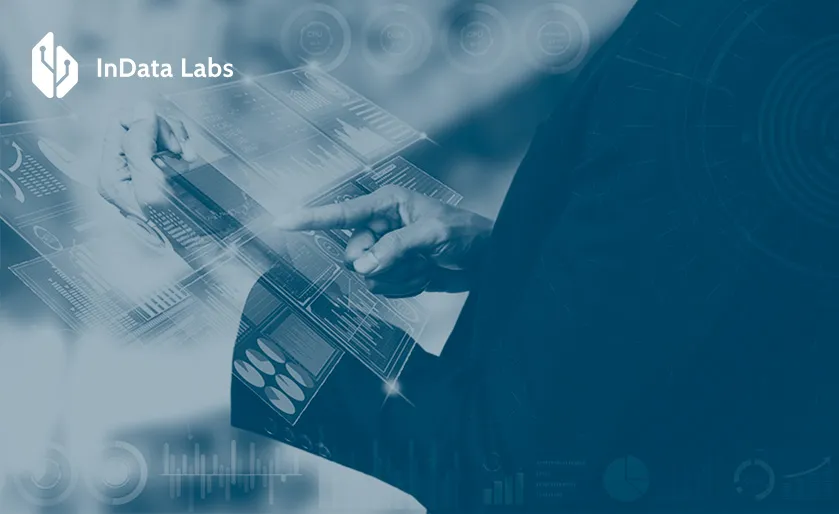The retail sector is among the most competitive markets, making it exceptionally difficult for businesses to not only thrive but even survive. Business intelligence in retail industry can be a colossal game changer for organizations struggling to compete.
BI for retail allows companies to leverage Big data analytics and machine learning techniques to extract valuable insights into their performance metrics. In this guide, we will examine the convergence of business intelligence and retail, discuss its adoption challenges, and identify best practices to ensure smooth adoption.
What is retail business intelligence?
Business intelligence in retail is a set of technologies that enables companies to uncover meaningful insights into the company’s performance. The technologies that make this possible include artificial intelligence, machine learning, and Big data analytics, allowing the system to accumulate, process, and analyze data while ML algorithms identify connections and patterns.

Source: Unsplash
During the process, numerous types of analyses are employed, including data mining, performance benchmarking, as well as descriptive and predictive analytics in retail. These complex analyses empower companies to streamline their inventory, assess suppliers, and yield a competitive advantage.
The main functionality of retail BI analytics solutions
Business intelligence tools can cover a highly versatile set of features, allowing companies to overcome their specific issues. Let’s break down the main use cases in retail for BI systems.
Sales analytics: Sales performance is one of the most crucial parts of any for-profit business, making sales analytics an omnipresent topic of discussion. BI retail solutions provide ample opportunities to track vital sales KPIs, break them down, and analyze their current status. Moreover, businesses can utilize their historical data to make accurate predictions about the sales potential of each product within different user groups.
Inventory management: Another essential function of BI in retail is inventory management optimization. The ability to monitor and forecast optimal inventory levels empowers companies to maximize their production without generating waste and losing money. Additionally, such systems aid businesses in optimizing their storage capacity as well as developing solutions to worst-case scenarios.
Customer analytics: Knowing your customers is imperative for any successful business venture, making customer analytics an integral part of BI retail solutions. Using these tools, you can analyze customer engagement, satisfaction with the services, user profitability, customer conversion rates, and lifetime value, among many other essential key performance indicators. Accessing these findings allows organizations to redesign their sales and marketing strategies to satisfy customer needs and wants.

Source: Unsplash
Supply chain optimization: Working with suppliers can be risky, as their poor performance will also reflect on your company’s reputation and profits. Business intelligence in retail sector provides a wide range of assessment tools to identify whether the supplier is trustworthy and risk-averse. Additionally, you can identify your supplier’s ability to timely fulfill orders and react to demand fluctuations to ensure a stable and reliable partnership.
Marketing efficiency: From tone of voice and messaging to merchandising, marketing is a huge part of an organization’s bottom line. Marketers employ BI solutions to gauge the potency of their campaigns, perform product analyses to avoid market cannibalism and develop efficient customer loyalty programs. Furthermore, such systems help companies create a holistic presence across multiple channels while keeping track of essential KPIs.
Pricing optimization: Pricing is more complex than can be initially perceived and requires an in-depth examination of the market and customer base. Especially for dynamic pricing models, identifying the perfect ratio for various customer segments, products, and platforms can be challenging. Business intelligence for the retail industry can deliver a simplified way to establish prices based on market benchmarks and customer data.
Data collection and analysis: All of the above-mentioned features are available due to BI’s ability to aggregate, process, and analyze immense amounts of data. By consolidating data from numerous sources in real-time, you can unlock vast forecasting capabilities, optimize processes, and make data-driven decisions.
How business intelligence solutions in retail work

Data gathering occurs through multiple channels, such as E-commerce platforms, social media sites, reports from brick-and-mortar stores, and other tools companies use to market and sell their products.
The unstructured information is then stored in data lakes and, after cleaning and processing, it ends up in data warehouses ready to be analyzed. Data warehouse examples include big players like Amazon Redshift and Azure Synapse as well as others such as Snowflake and BigQuery. Using BI solutions for retail, companies can perform various types of analyses to pull valuable insights.
For example, descriptive analysis leverages historical data to find connections and patterns, while predictive analytics is designed for forecasting. Big data analytics is the crux of business intelligence, allowing corporations to extract actionable insights from large volumes of raw data.

Source: Unsplash
Finally, the findings can be utilized to bolster your strategies and create better value for the customer. Retail business intelligence solutions also provide cutting-edge data visualization capabilities, allowing even non-tech employees to grasp the results. This stage is ongoing and continues through reevaluation and iteration to granularly improve your efforts when more data becomes available.
Advantages of business intelligence in the retail industry
Now that we have learned the basic functionality of BI systems, let’s dive into the benefits of business analytics and business intelligence solutions in retail.
Improved customer experience
Retail analytics business intelligence paves the way to deepen the bond between brands and customers. Gaining access to customer behavior patterns facilitates a better understanding of how, what, and when they make purchasing decisions and leverages these findings. Through the creation of more powerful marketing campaigns and precise targeting efforts, companies can increase customer retention and improve customer services.

Source: Unsplash
Additionally, BI software allows for the development of personalized shopping experiences. By investigating customer browsing and purchasing history, machine learning algorithms can accurately identify which products they might be interested in. According to McKinsey research, offering tailored suggestions drives up revenue by 10% to 15%, making it a viable strategy to increase profitability.
Operational efficiency
Operational efficiency implies balanced resource management which can be achieved through proper implementation of various technological tools. For instance, streamlined inventory management paired with an optimized supply chain leads to a general improvement in business operations. By eliminating common supplier hurdles like delays, shortages, stockouts, and others, you can minimize excess costs and strengthen the reputation of your brand.
Cost benefits
Similarly, historical data can be applied to identify the most budget-draining processes. To fix the issue, these processes can be automated to remove human errors, reallocated to another department, or eliminated if redundant. Pricing analysis can also lead to cost benefits by identifying the price that delivers the highest ROI without jeopardizing the quality of production or marketing.

Source: Unsplash
Enhanced predictability
Predictability is among the most critical benefits of business intelligence in retail industry. Access to data-driven insights allows you to minimize unexpected scenarios and prepare action plans for diverse roadblocks. DevOps predictability research indicates the importance of gaining insight into potential risks and planning for the future.
Improved decision making
The ability to harness the power of historical data opens doors to a wide range of opportunities. Through a deeper perception of your customer base, businesses can offer services that appeal to user-specific needs. Refined inventory management allows for planning manufacturing and storing while considering multiple aspects, including ideal storage conditions, energy consumption, market demands, etc. Insights into marketing campaigns assist businesses in improving their targeting, messaging, and promotion.
These findings provide a reliable foundation for smart and data-driven decisions that will push the company in the right direction. If you want to learn more about advanced data analytics, watch this video:
Adoption challenges of retail business intelligence software
A number of studies have identified the biggest hurdles organizations face when implementing retail business intelligence solutions. While 76.1% of respondents couldn’t locate suitable BI for retail, 71% lacked the human resources to complete the transition. High costs of implementation and technical complexity are also among the critical hindrances on the way to digital transformation.
Although the majority of respondents understood the benefits of AI solutions for retail, many of them still aren’t utilizing data analytics to better their businesses. In this section, we will investigate the most common BI implementation issues.
Technical challenges
Among the main challenges of BI implementation is sourcing high-quality data. Whenever machine learning systems operate with subpar datasets, the outcomes suffer. Essentially, you won’t be able to extract meaningful insights from inaccurate, duplicate, or unprocessed data rendering the entire adoption useless.

Source: Unsplash
Cost-related issues
Retail industry business intelligence tools can be extremely expensive, especially for startups or small-scale companies. The initial costs of business analytics, followed by the identification of problematic areas and the development of systems to resolve them require considerable investment. Off-the-shelf products might be less costly than custom but they provide less flexibility and customization making them not as effective.

Security concerns
Sourcing and storing data requires strict compliance with privacy laws, particularly in sensitive data-heavy industries like healthcare and finance. Amid the ever-growing cybercrime, safeguarding your assets and making sure your customers are protected is imperative.
Not only will data breaches impact your reputation and customer trust but also create considerate expenses. With the average cost of a data breach reaching a whopping $4.88 million in 2024, this burden can be quite significant to your company’s financial prospects.
Talent challenges
Retail companies oftentimes lack the technical expertise to properly implement and systematize the use of business intelligence and data insights solutions. As a result, they tend to underuse these solutions and fail to get returns on their investments, leading to frustration and budget losses.

Source: Unsplash
To maximize the benefits of business intelligence, retail industry businesses should consider employing tech specialists or collaborating with an IT agency. Although hiring in-house BI experts can be a pricey and costly process, delegating the adoption to a third-party company is a viable solution.
Choosing the right BI retail management solution
In the abundance of excellent business intelligence tools for retail, selecting the right solution can be a difficult process. Especially if you lack in-house specialists, deciphering which product may fit your specific needs is a complex journey. The current market leaders are the following business intelligence examples: Datawiz for superb data visualization, Power BI for great customization, and Domo for universal business intelligence toolkit.
Another option is to partner up with a credible software development company to develop a tailored solution that will perfectly address your concerns. Although more expensive than off-the-shelf business intelligence solutions for retail, custom software offers more flexibility and brings higher ROI in the long run.
Best practices for implementation of business analytics and business intelligence solutions in retail
To bypass the common pitfalls of business intelligence adoption, consider taking into account the following best practices.
-
Analyze the current state of the company
First and foremost, decide why you’re investing in business intelligence for retail. Maybe you’re looking to drive up user experience or improve your marketing efforts. You need to clearly define the problem or problems you’re trying to solve with a BI system and assign metrics to these issues. Without measurable KPIs, evaluating the success rate of the adoption would be virtually impossible.
If you’re discovering numerous issues that need addressing, it’s recommended to break them down into more manageable steps and prioritize. Start by tackling the most pressing concerns and move down the list in future iterations.
-
Ensure the skill is there
If your company lacks the technical skill to execute the transition, consider either hiring a specialist or outsourcing the project to a qualified Big data development firm.
However, your existing staff still needs to be educated on how to work with BI tools. Provide training and educational material for your employees to understand the role of business intelligence in retail industry and learn how to use them for their particular duties and objectives.
-
Improve your data management
As already mentioned, poor data is detrimental to the quality of outcomes. That’s why it’s important to collaborate with tech specialists who know how to collect, process, and store data properly. Another best practice is to establish a rulebook for data entry, storage, and ownership to ensure transparency and accountability across the organization.

-
Select the best tool
If you have decided on an off-the-shelf solution, evaluate each option to determine which complements your infrastructure the best. Investigate the features, strengths, and weaknesses of each platform to find the one that works for you. Alternatively, look for a reliable agency that can build a custom solution for your business.
The future of retail business intelligence solutions
Among the biggest trends in retail is technology democratization, which allows non-tech employees to use BI tools to their fullest extent. This is accomplished through augmented analytics that leverages artificial intelligence to automate data manipulation processes and make them accessible to marketers, sales personnel, and other non-IT staff members.
Mobile retail BI solutions are also gaining more traction within the industry allowing people to access dashboards and reports from their smartphones. This flexibility enables specific location-based insights and helps employees get an overview of data insights even outside of their offices.
Hyper-personalization is another emerging trend taking personalization to the next level. Unlike traditional tailoring, hyper-personalization employs real-time data to provide a unique experience for each customer.
The future application of business intelligence in retail industry will also be reshaped by AI and IoT. While AI tools can automate inventory management by identifying products on the shelves and transmitting the information to the data center, IoT can go even further. By installing sensors inside the stores, companies can collect data on customer traffic, and monitor temperature and humidity to ensure product quality and enhance security.
If you’re interested in becoming part of this future, consider reaching out to InDataLabs. A leading data science organization, we build custom AI-powered solutions for companies in the retail industry. Our cumulative experience and expertise make us a great partner to build a tailored retail BI solution that solves your unique issues.



